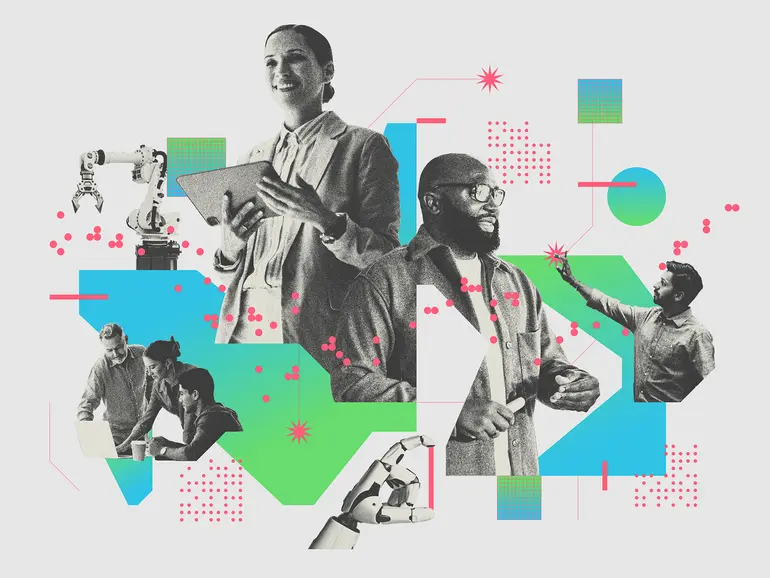Download: Workforce development in the age of AI
From MIT experts, strategies to transform skills, roles, and human potential across your organization.

Faculty
Danielle Li is the David Sarnoff Professor of Management of Technology and a Professor at the MIT Sloan School of Management, as well as a Faculty Research Fellow at the National Bureau of Economic Research. Her research interests are in economics of innovation and labor economics, with a focus on how organizations evaluate ideas, projects, and people.
Danielle's work has been published in leading academic journals across a range of fields, including the Quarterly Journal of Economics, Science, and Management Science. In addition, her work has been regularly featured in media outlets such as the Economist, New York Times, and Wall Street Journal.
She has previously taught at the Harvard Business School and the Kellogg School of Management. She holds an AB in mathematics and the history of science from Harvard College and a PhD in economics from MIT.
Featured Publication
"Discretion in Hiring."Hoffman, Mitchell, Lisa Kahn, and Danielle Li. Quarterly Journal of Economics Vol. 133, No. 2 (2018): 765-800. Download paper.
Featured Publication
"Public R&D Investments and Private Sector Patenting: Evidence from NIH Funding Rules."Azoulay, Pierre, Joshua S. Graff Zivin, Danielle Li, and Bhaven N. Sampat. Review of Economic Studies Vol. 86, No. 1 (2019): 117-152.
Li, Danielle, Lindsey Raymond, and Peter Bergman. Review of Economic Studies. Forthcoming. Accepted Manuscript.
Benson, Alan M., Danielle Li, and Kelly Shue. American Economic Review. Forthcoming.
Azoulay, Pierre, Matthew Clancy, Danielle Li, and Bhaven N. Sampat. Science Vol. 389, No. 6767 (2025): 1303-1305. Replication package. Supplementary Online Material.
Brynjolfsson, Erik, Danielle Li, and Lindsey R. Raymond. The Quarterly Journal of Economics Vol. 140, No. 2 (2025): 889-942. arXiv Preprint.

From MIT experts, strategies to transform skills, roles, and human potential across your organization.

Artificial intelligence can be useful in the workplace, but humans have to first define what success looks like, according to MIT Sloan’s Danielle Li.
A paper by professor Danielle Li and co-author showed that being a good salesperson increased the probability of being promoted into a management position, but was a negative predictor of managerial quality. In other words, the performance of a sales hotshot's new subordinates tended to go backwards.
A recent study co-authored by professors Pierre Azoulay and Danielle Li looked at drugs that were developed through NIH-funded research and approved by the Food and Drug Administration since 2000. More than half those drugs would probably not have been developed if the NIH was operating with a 40% smaller budget. "We can't say, 'But for that grant, that specific drug would not have come into existence,'" said Azoulay. But fewer drugs overall would have made it to market, he said.
A new study by professors Pierre Azoulay, Danielle Li, and co-authors, has revealed the potential impacts a smaller National Institutes of Health (NIH) would have had on past drug development. If the NIH budget had been 40% smaller from 1980 to 2007 — the level of cuts that President Donald Trump has proposed for the agency — the science underlying numerous drugs approved in the 21st century would not have been funded, according to the analysis. "Cuts today are going to have effects starting 15 years from now, roughly, and then accelerating from there," Azoulay said.
Competence penalties against women who perform identically to men are most likely to arise when evaluators use highly subjective assessment criteria, like "potential." "The problem with evaluating potential is that it's poorly defined, which leaves a lot of room for interpretation," said professor Danielle Li. "The moment you veer off metrics, that's where people's stereotypes and perceptions now have room to exist."
This program is designed to help you meet the escalating demand for strategic AI-and machine learning-informed leadership and gain a strategic advantage for your organization in an AI-driven world.
Over six weeks, you’ll explore the technical and strategic considerations for robust, beneficial, and responsible AI deployment. You’ll examine the various stages of a proprietary ML Deployment Framework and unlock new opportunities by investigating the key challenges and their related impact. Guided by leading experts and MIT academics, you’ll build a toolkit for addressing these challenges within your own organization and context.